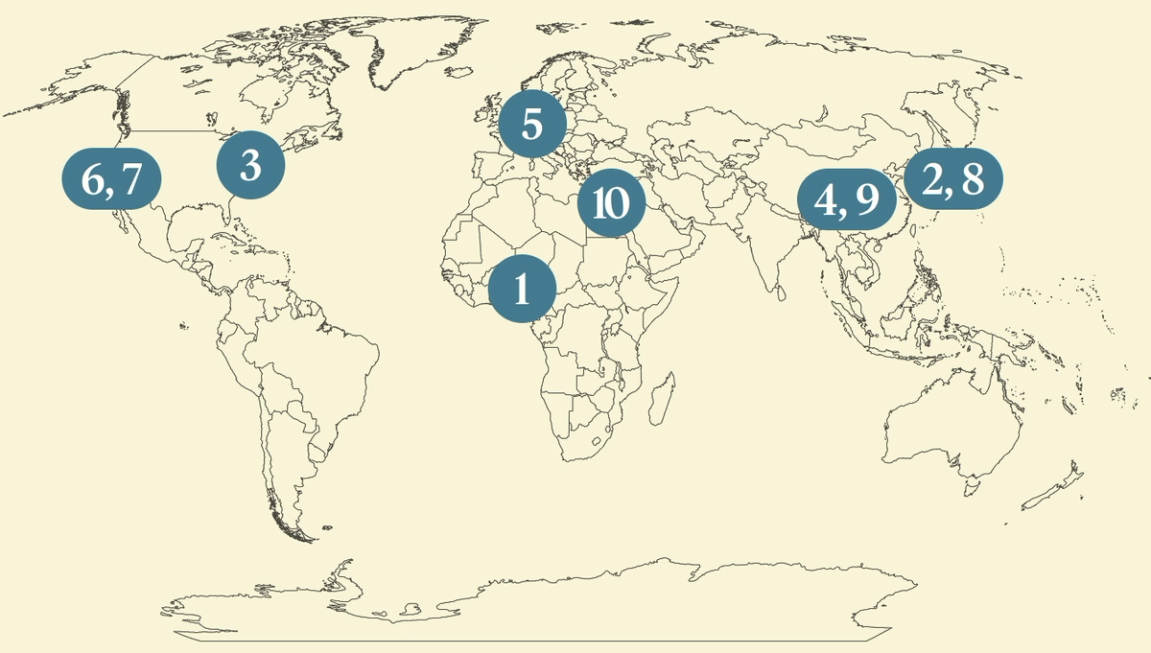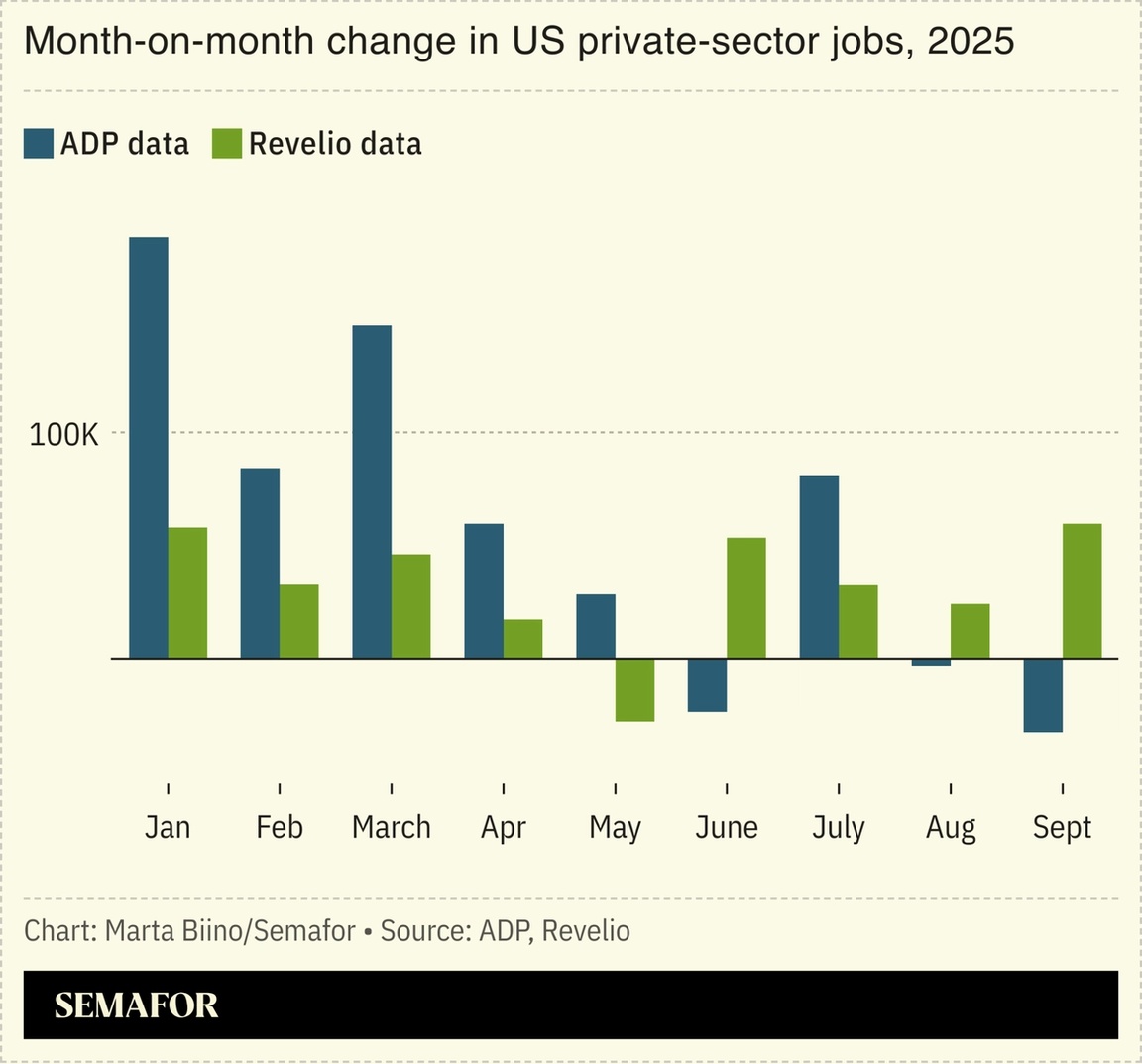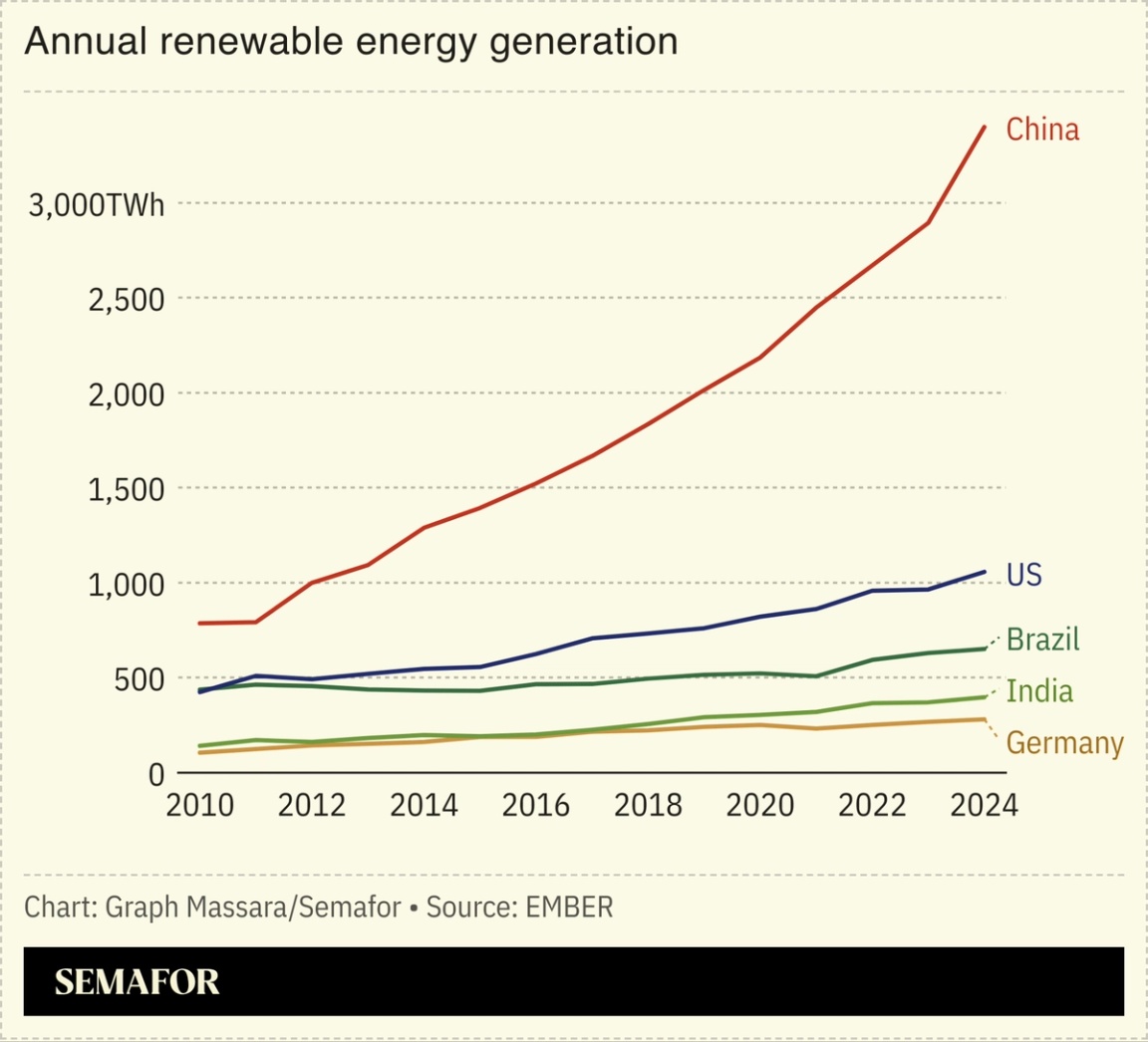| | Donald Trump threatens military action against Nigeria, the leaders of China and South Korea joke ab͏ ͏ ͏ ͏ ͏ ͏ |
| |  | Flagship |  |
| |
|
The World Today |  - Trump threatens Nigeria
- SK grows closer to China
- US labor market shifts
- Green investor heyday
- Germany invests in fusion
- Anduril’s unmanned drone
- Supersonic plane flies
- Japan cheers Dodgers win
- China marathon cancellations
- Egypt museum opens
 A 16th-century Indian painting breaks records, and why risky objects will define the next era of tech innovation. |
|
Nigeria alarmed over Trump threat |
 Sodiq Adelakun/Reuters Sodiq Adelakun/ReutersUS President Donald Trump’s threat of military action in Nigeria over the killing of Christians alarmed the country’s leaders, who are already on their back foot in Washington. Trump’s warning of going “guns-a-blazing” into Africa’s most populous country is a “once-outlandish image,” Semafor’s Africa editor wrote, but it is “being taken seriously as Nigerian leaders watch US forces move in on Venezuela.” Abuja rejects the narrative of “Christian killings” that has bubbled up on the American right, though Nigeria has failed to stop terrorist groups that have killed thousands of Christians and Muslims. And while diplomacy has been an effective tool for other countries in Trump’s second term, Nigeria doesn’t have an ambassador in Washington to negotiate with the White House. |
|
South Korea balances US, China |
 The Presidential Office/Yonhap/via Reuters The Presidential Office/Yonhap/via ReutersThe leaders of China and South Korea moved to rebuild relations after years of weakening economic ties and a closer Seoul-Washington partnership. The first summit between Xi Jinping and South Korea’s new president, Lee Jae Myung, underscored Seoul’s balancing act between the US and China: While Lee sealed a US trade pact days ago, he was jovial with the Chinese leader on Saturday. They joked about the usually fraught subject of cyberespionage after Xi gifted two Chinese-made phones with Korean displays, marking a rare, off-the-cuff moment for the Chinese leader in a public setting. The exchange reflected efforts by both countries to bolster economic ties; Korean investment in China has tumbled in recent years. |
|
US labor market now ‘no hire, more fire’ |
 The US labor market’s post-pandemic penchant for holding on to employees is coming to an end, analysts say. For years, many large businesses effectively hoarded workers, leading to a “no hire, no fire” environment; that’s now shifted to a “no hire, more fire” job market, a Reuters columnist wrote. Amazon, UPS, Intel, Accenture, and Microsoft have announced layoffs recently, citing shrinking margins and the adoption of AI. Investors have welcomed the job cuts this year; one economist likened the mood to the 1990s, when “we used to reward companies for letting people go.” The trend carries risks for the broader economy — though experts don’t have the full picture without official data, which isn’t being released during the US government shutdown. |
|
‘Glory days’ for green investors |
 Clean-tech stocks are surging this year despite US President Donald Trump’s attacks on the sector. A global demand for energy to power AI data centers, coupled with China’s renewables boom, has outweighed the Trump administration’s cancellation of EV subsidies and government programs dedicated to wind and solar development, Bloomberg reported. One analyst declared it the “glory days” for green investors, as the industry has outperformed much of the rest of the market. The sector’s future, though, has become intertwined with the debate over whether the AI industry is facing a bubble that risks bursting and pulling down renewable energy with it. The endgame will be “a lot of disappointment,” one hedge fund manager cautioned. |
|
Germany bets on nuclear fusion |
 Michaela Stache/Reuters Michaela Stache/ReutersGermany will invest $2 billion in nuclear fusion research in a bid to achieve net zero by 2045. Fusion power works by squeezing hydrogen atoms together, the same process that powers the sun. It in theory would create limitless clean energy but until recently has seemed far off. Germany has created an uphill battle for itself to reach net zero by phasing out traditional, fission-based nuclear power in 2023. Analysts have argued that it could have reduced emissions 73% faster by maintaining fission plants. It is a world leader in developing renewable energy, but renewables are intermittent, meaning it relies on coal to smooth out supply. The fusion investment is a “long‑term strategic bet” to replace fossil fuels, an expert told DW. |
|
Anduril flies uncrewed jet drone |
 Anduril/Handout via Reuters Anduril/Handout via ReutersUS defense firm Anduril flew its uncrewed, jet-powered drone for the first time on Friday, reflecting the country’s embrace of semi-autonomous military craft. The drone can manage flight controls and throttle adjustments without human commands, the company said. The US military envisions being able to eventually deploy a swarm of drones without pilots in the event of a future conflict in the Pacific, and is leaning on the private sector to do so. But questions about guardrails for such technology are growing increasingly urgent, especially when “we give software the power to kill,” Semafor’s technology editor wrote. “It’s worth a public conversation on hard questions like the standard for accuracy.” |
|
NASA tests quieter supersonic plane |
 David Swanson/Reuters David Swanson/ReutersNASA’s quiet supersonic test plane took its first flight, potentially bringing a new era of faster-than-sound travel closer. When planes pass the speed of sound — hundreds of miles per hour faster than airliners’ typical cruising speed — the pressure waves they generate merge into powerful shockwaves that reach the ground all at once, creating a “boom” that can shake windows. The US banned supersonic flight in 1973, but a new jet design, including a sharper nose and engines above the wings, will create what NASA hopes will be more like a sonic “thump.” US President Donald Trump has ordered regulators to reverse the ban, and both NASA and the aviation company Boom hope to let passengers break the sound barrier again. |
|
 Ken Burns has been telling the story of America through his entire career with genre-defining documentaries on the Civil War, the Vietnam War, and now the American Revolution. This week, Ben and Max bring on the renowned documentarian to talk about his latest series, the parallels he sees between America’s founding moment and today’s media environment, and what we can learn from our history. They also discuss what he makes of the Trump administration’s cuts to PBS, and — after spending 10 meticulous years making a 12-hour documentary — his take on short-form video and talk podcasts like this one. |
|
 Kim Kyung-Hoon/Reuters Kim Kyung-Hoon/ReutersThe Los Angeles Dodgers’ World Series victory reflected the increasingly global nature of baseball, as two Japanese stars featured prominently in the Game 7 showdown. Shohei Ohtani, arguably the biggest celebrity in Japan, hit and pitched for the Dodgers on Saturday against the Toronto Blue Jays, while Yoshinobu Yamamoto relief-pitched and was named MVP. “I am so proud today to be Japanese,” a Tokyo cab driver told The Associated Press. In addition to being an economic force, the sport has also been used as a diplomatic tool: When US President Donald Trump visited Japan last week, he sat down with new Prime Minister Sanae Takaichi to watch some of the World Series together. |
|
China has too many marathons |
 Tingshu Wang/Reuters Tingshu Wang/ReutersThe Chinese public is obsessed with road races, and the authorities are getting tired of it. Nearly 100 running events, from marathons to smaller fun runs, were canceled or scaled back across the country this fall in the “sharpest nationwide pullback in the sport since the pandemic,” Sixth Tone reported. Running events have exploded in recent years, but the rapid growth led to concerns of weak race management, safety lapses, and rule violations; new guidelines tighten the approval process for future races. The cancellations also dent officials’ efforts to use the races to boost consumption amid a wider slump in demand; marathons are economic drivers, as well as branding tools, for local governments. |
|
Egyptian museum is finally open |
|
|